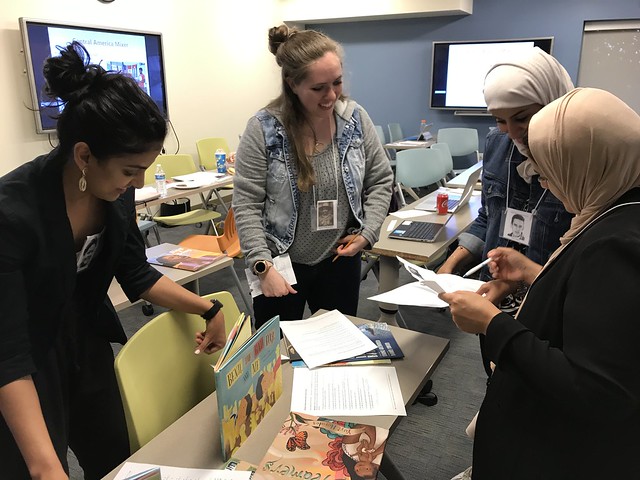Teaching for Change Delivers Workshop to Pre-Service Teachers at Marymount University
Can you name a historical figure from Central America? This was one of the opening questions Teaching for Change Executive Director Deborah Menkart asked a class of pre-service education graduate students in Dr. Elizabeth Langran’s Cross-cultural/International Curricula class at Marymount University. Out of the twelve students, one was able to name Archbishop Oscar Romero. A few students noted how they had never been taught about Central America in their own schooling experiences and it was unfortunate they couldn’t name more figures. This sentiment is typical in Teaching Central America workshops, where most attendees share that they never learned about the heritage, literature, or history of the region.
The graduate students came from a variety of backgrounds and plan to teach in all level classrooms, including early childhood, elementary, middle, and high school. Langran invited Teaching for Change to her class on Wednesday, May 1 to share resources and highlight Teaching Central America lessons that the future educators can use in their future classrooms.
The workshop started with an overview of Teaching for Change’s mission and projects, followed by a few example exercises from the Teaching for Central America website. Students were first asked to name the seven countries in Central America and then place the countries on a blank map, using a list of hints to help with scaffolding and remembering key facts about each country.
After, each student was given a name tag and short biography with information about a noted Central American historical figure or an individual who played a role in the United States’ relationship with Central America. Each student took on the role of their figure and participated in a mixer, where they had to introduce themselves to other figures and interview them to answer questions. For example, students had to find someone who was an activist and then learn more about what consequences they faced because of their activism. Figures included Rigoberta Menchú, Archbishop Oscar Romero, Giocondo Belli, and more. The graduate students took their roles very seriously and embodied the spirit of their figure based on the information given.
Students shared their thoughts on the activity including,
I liked having a new identity and learning about other people’s identities like Roberto Clemente, the famous Puerto Rican baseball player.
(Note: Roberto Clemente is used as a figure in this lesson because he died while en route to deliver aid to Nicaragua after the country experienced a massive earthquake.)
The second part of the workshop gave students an opportunity to look through some of the children’s books from the curated book list on Social Justice Books and also some of the books that Teaching for Change actively critiques. As students delved into books such as Mumbet’s Declaration of Independence and Julián is a Mermaid, they had deep conversations about how to be intentional about the resources they give to their students.
One participant said in response to the question about what important things they learned from the session,
That every child deserves the truth.
As the conversation wrapped, many students felt that they now had more resources and tools to critique the hidden messages that are often in literature and challenge racist and discriminatory messages in their practice.
One student shared,
Thank you for thought-provoking, insightful conversations and for challenging the norm.
As these pre-service teachers enter the classroom, we hope that our resources will aid them in making their classrooms equitable spaces where students can see themselves reflected in the curriculum and help pave the path for teachers and students to become active global citizens.
Photos from Event
Cierra Kaler-Jones is the Education Anew Fellow with Communities for Just Schools Fund and Teaching for Change. She is also a Ph.D. student at University of Maryland, College Park studying minority and urban education.


